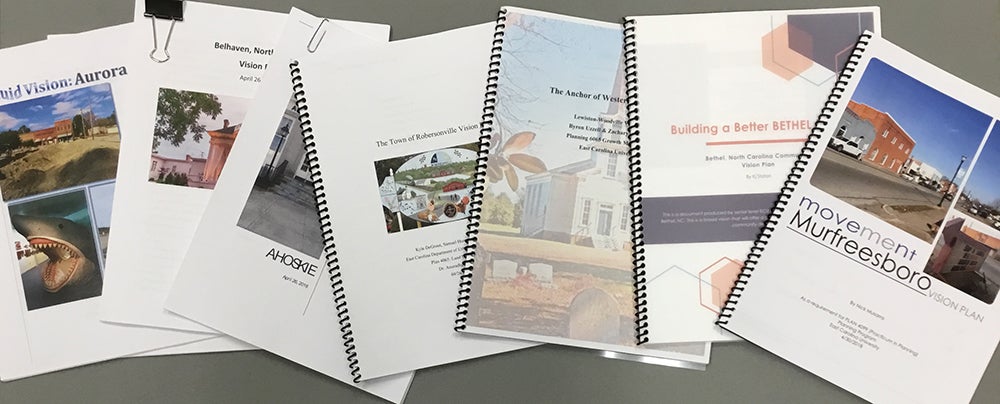Planning Program Lives ECUs Motto – To Serve
The Urban and Regional Planning program embodies East Carolina University’s (ECU) motto – servire, ‘to serve’. Student projects in the program often work with real-world clients and address pressing community needs, thus serving as a model for community outreach that aligns closely with ECU’s mission for public service. In Spring 2018, the Land Use Planning course (PLAN 4065) taught by Dr. Anuradha Mukherji teamed with the Mid-East Commission as its primary client to work on creating community development vision plans for eight small towns across eastern North Carolina.
The Mid-East Commission put forward the idea of creating vision plans for small towns that dot the five counties it serves. Based in Washington, North Carolina, the Mid-East Commission is a non-profit that provides planning services to local governments. It serves Tier 1 counties (the poorest counties) in eastern North Carolina including Martin, Bertie, Pitt, Beaufort, and Hertford. The impetus for the project came from the reality that most funding agencies require that communities they invest in have a vision plan. Having some type of plan, vision or direction for the community indicates that the community is committed to a set of development goals, which in turn helps them attract resources for specific projects down the road. The towns themselves do not have the capacity for creating such vision plans. This is where the planning program came in. In most of the small towns, much of the small retail (the mom & pop shops) have gone out of business as retail has been diverted to bypass and other busy thoroughfares over the past several decades, and there is not much life in the downtown areas. Hence, students focused on the primary question of how to bring the downtowns back to life in the project communities.
Eight communities were targeted for the project, including Belhaven, Ahoskie, Town of Robersonville, Bethel, Aurora, Lewiston-Woodville, Murfreesboro and Grifton. Students worked individually and in groups of two or three to collect relevant data, carry out visual documentation of their project site, review related plans and policies, speak to community members and stakeholders, and conduct site condition analysis. As the towns did not have a clearly articulated problem, a significant part of student efforts was to define the priority planning problem(s) to be addressed. Based on the data and site condition analysis, each group identified the most pressing needs in their project towns and put forward a set of developmental goals and recommendations to address those needs. The final deliverable for each group was a vision plan document for their community and presentation of the plan to the Mid-East Commission, community members from project towns and other professional planners.
The project served as a positive experience for the students as they engaged in a real-world problem, gained a deeper understanding of planning through practice, and contributed in a meaningful way to the future of each of the eight project towns.
In addition, because the targeted communities are representative of rural North Carolina, students specifically gained insights on planning practice in a rural setting.
The student efforts and their final documents were well received by the Mid-East Commission as evidenced by this note from Jamie Heath, Planner at Mid-East Commission: “We were impressed by the work the students did in such a short time. We look forward to future partnerships”. The Mid-East Commission continues its partnership with the ECU planning program this semester and is currently working with the planning capstone studio class on park and recreation projects for two communities in eastern North Carolina.
As a program, we are proud of our students’ and their commitment to serve the eastern North Carolina region through projects that address planning needs in local communities.
Go Pirates!
